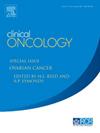Artificial Intelligence in Health Care: A Rallying Cry for Critical Clinical Research and Ethical Thinking
IF 3.2
3区 医学
Q2 ONCOLOGY
引用次数: 0
Abstract
Artificial intelligence (AI) will impact a large proportion of jobs in the short to medium term, especially in the developed countries. The consequences will be felt across many sectors including health care, a critical sector for implementation of AI tools because glitches in algorithms or biases in training datasets may lead to suboptimal treatment that may negatively affect the health of an individual. The stakes are obviously higher in case of potentially life-threatening diseases such as cancer and therapies with a potential for causing severe or even fatal adverse events.
Over the last two decades, much of the research on AI in health care has focussed on diagnostic radiology and digital pathology, but a solid body of research is emerging on AI tools in the radiation oncology workflow. Many of these applications are relatively uncontroversial, although there is still a lack of evidence regarding effectiveness rather than efficiency, and—the ultimate bar—evidence of clinical utility. Proponents of AI will argue that these algorithms should be implemented with robust human supervision. One challenge here is the deskilling effect associated with new technologies. We will become increasingly dependent on the AI tools over time, and we will become less capable of assessing the quality of the AI output.
Much of this research appears almost old-fashioned in view of the rapid advances in Generative artificial intelligence (GenAI). GenAI can draw from multiple types of data and produce output that is personalised and appears relevant in the given context. Especially the rapid progress in large language models (LLMs) has opened a wide field of potential applications that were out of bounds just a few years ago. One LLM, Generative Pre-trained Transformer 4 (GPT-4), has been made widely accessible to end-users as ChatGPT-4, which passed a rigorous Turing test in a recent study. In this viewpoint, I argue for the necessity of independent academic research to establish evidence-based applications of AI in medicine. Algorithmic medicine is an intervention similar to a new drug or a new medical device. We should be especially concerned about under-represented minorities and rare/atypical clinical cases that may drown in the petabyte-sized training sets. A huge educational push is needed to ensure that the end-users of AI in health care understand the strengths and weaknesses of algorithmic medicine. Finally, we need to address the ethical boundaries for where and when GenAI can replace humans in the relation between patients and healthcare providers.
医疗保健中的人工智能:关键临床研究和伦理思考的战斗口号
人工智能(AI)将在中短期内影响很大一部分工作,尤其是在发达国家。包括医疗保健在内的许多行业都将感受到这一影响,而医疗保健是实施人工智能工具的一个关键领域,因为算法中的故障或训练数据集中的偏差可能导致次优治疗,从而对个人健康产生负面影响。在过去二十年里,医疗保健领域的人工智能研究主要集中在放射诊断学和数字病理学方面,但关于放射肿瘤学工作流程中的人工智能工具的大量研究正在涌现。其中许多应用相对来说并无争议,但仍缺乏有关有效性而非效率的证据,以及临床实用性的最终证据。人工智能的支持者会认为,这些算法应该在强大的人工监督下实施。这里存在的一个挑战是与新技术相关的裁员效应。随着时间的推移,我们将越来越依赖人工智能工具,而我们评估人工智能产出质量的能力也将越来越弱。鉴于生成式人工智能(GenAI)的飞速发展,很多研究都显得过时了。GenAI 可以从多种类型的数据中提取信息,并生成个性化的、与特定语境相关的输出结果。尤其是大型语言模型(LLMs)的快速发展,为潜在应用领域开辟了广阔的天地,而这在几年前还是不可能实现的。其中一个 LLM,即生成预训练转换器 4(GPT-4),已作为 ChatGPT-4 广泛提供给终端用户,并在最近的一项研究中通过了严格的图灵测试。在这一观点中,我认为有必要开展独立的学术研究,以确立人工智能在医学中的循证应用。算法医学是一种类似于新药或新医疗设备的干预措施。我们应该特别关注代表性不足的少数群体和罕见/典型临床病例,它们可能会淹没在PB级的训练集中。我们需要大力开展教育工作,确保人工智能在医疗保健领域的最终用户了解算法医学的优缺点。最后,我们需要解决 GenAI 在患者和医疗服务提供者之间的关系中何时何地可以取代人类的伦理界限问题。
本文章由计算机程序翻译,如有差异,请以英文原文为准。
求助全文
约1分钟内获得全文
求助全文
来源期刊

Clinical oncology
医学-肿瘤学
CiteScore
5.20
自引率
8.80%
发文量
332
审稿时长
40 days
期刊介绍:
Clinical Oncology is an International cancer journal covering all aspects of the clinical management of cancer patients, reflecting a multidisciplinary approach to therapy. Papers, editorials and reviews are published on all types of malignant disease embracing, pathology, diagnosis and treatment, including radiotherapy, chemotherapy, surgery, combined modality treatment and palliative care. Research and review papers covering epidemiology, radiobiology, radiation physics, tumour biology, and immunology are also published, together with letters to the editor, case reports and book reviews.
 求助内容:
求助内容: 应助结果提醒方式:
应助结果提醒方式:


